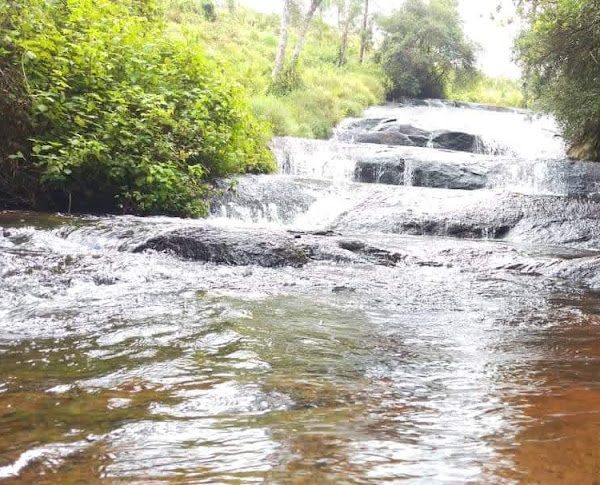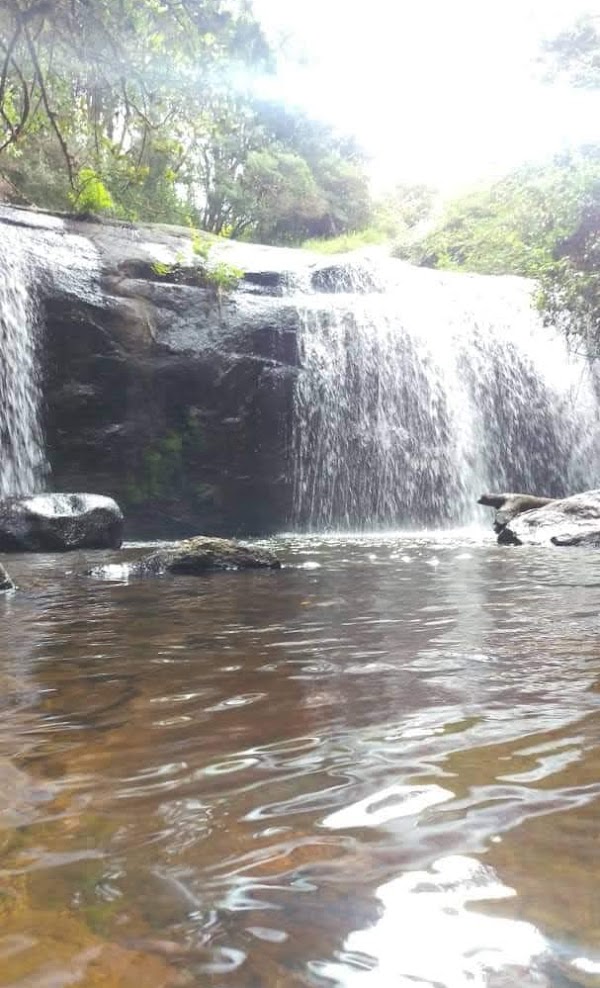By Solister Mogha

Zomba, August 31, Mana: The sight of splashing cold water catches the eye bringing the amazing feeling to watching time and time again.
William falls located at the apex of Zomba plateau is such a place that makes one appreciate God’s creation and also the wonders that Malawi has but under-utilized for economic benefits.
The deep and thick forest littered with pine and some indigenous trees, the chilly weather and soothing sound of birds makes the place a home and a-must-come back for the first-time visitors.
Located at a distance of about eight kilometers from the Zomba City ‘center’ and a few metres away from Sunbird Ku Chawe, William Falls was discovered by a Scottish, Mr. William.
Zomba District Tourism Officer, Gift Mwale explains that Mr. William, a tourist, was the first plantation manager for the plateau and during his tenure, discovered the falls, which he later christened his name.
“Although there is little literature about the falls, the only available information is that there was a white tourist who fell in love with the beautiful looking Zomba Mountain and decided to explore more about it. He later popularized the falls; hence, it is named after him,” says Mwale.
Today, the iconic falls has become a leisure centre for people of Zomba and other neighbouring districts. People from as far as Blantyre, Machinga and Phalombe flock to the place to spend their time away and most importantly, appreciate the beautiful falls.
Fleets of cars are, every week- end, are spotted heading towards the direction of the falls. While some stop at the Mulunguzi Dam, another attractive and beautiful scenery at the plateau.
However, many proceed to the falls to relax and off-course, appreciate the forgotten tourism ‘gold.’
Driving through the meandering Ku Chawe Road, one can easily feel the urge to visit the attractive place.
Before the falls, the emperor’s view, the Mulunguzi Dam and the thick and long pine trees and some indigenous plantations along the road provides the anticipated and excitement ahead.

Sunbird Ku Chawe Hotel, a masterpiece architectural structure standing along the road also provides the ‘feel at home’ atmosphere as one proceeds towards the falls.
Despite the potential that the falls has to contribute to the country’s socio-economic growth, it is nevertheless, forgotten and deserted.
Most of the tourists visiting the place endure the pain of driving through the rugged and bumpy road.
In addition, there are no amenities at the place to make it more attractive.
Beatrice Kaunda, a regular visitor says if only the Department of Tourism had thought of improving the road and putting up some structures where people could find food and accommodation, the place would attract more tourists and improve on revenue generation.
Although she has visited the place several times, Kaunda says she is never tired of going back to relax at the falls.
“This is one such place that you would always want to come and relax, the only challenge, however, that is distracting many from visiting is the poor road network as well as unavailability of shops and lodges,” Kaunda explains.
Kaunda, therefore, appeals to the Department of Tourism to consider improving the road network to make the falls accessible.
On the other hand, a Blantyre resident, Mike Phiri says he likes visiting the falls because of its tranquility and ambience.
“I generally like nature and the falls provides that. William Falls is an amazing place that we need to utilize if we are to broaden our revenue generation base,” says Phiri.
He concurs with Kaunda on the need to improve the road network and suggests that erecting structures would make the place more attractive and habitable.
However, there are no plans by the Department of Tourism to rehabilitate the road and improve the area to be more attractive, according to Mwale.
Mwale discloses that the only plans that the Department of Tourism has are to construct roads to only major tourist attraction sites.
“We have no plans at the moment despite the recent launch of the Tourism Investment Master Plan which advocates for easy access to all tourist attractions,” he states.
He acknowledges that unlike in the past, there is growing demand in terms of domestic tourism as more Malawians have started patronizing and touring some tourism attraction areas.
Mwale confesses that the tourism sector has the potential to contribute to the country’s economy and that he believes that more should be done is commercialization of most of the tourism attraction sites.
“Tourism is a business that if seriously invested in could foster development of the country. What we need is easy access to all places; improve on infrastructure development and collaboration of all players in the sector,” Mwale emphasises.
He adds: “William Falls has the potential to generate enough revenue for the country because of its attractiveness. However, there is nothing that can be done for now for us to tap from that hidden treasure.”
Mwale says the overall challenges facing the tourism sector are fragmentation where each player works in isolation, weak legal framework, un-developed attractions, weak marketing strategy and low capacity in terms of human skills and finances.
Chairperson for Zomba Civil Society Organization Network, Sammy Aaron expresses dissatisfaction with unavailability of plans to improve the tourism attraction sites in Zomba, particularly at William Falls.

Aaron says since tourism was becoming the big and powerful revenue-generating tool, it was important for the Tourism Department to invest in the sector.
“Tobacco which was the economy depended on for forex generation has been facing resistance at the international market and what it means therefore is that the country must find alternative sources of forex,” he says.
According to the Malawi Domestic Tourism Marketing Strategy (MDTMS), a five-year blue print for the promotion of domestic tourism in Malawi, tourism is one of the catalysts for development growth.
The strategy clearly states that domestic tourism in Malawi has great potential to contribute to overall growth of the tourism sector as statistics show that domestic tourism in 2016 accounted for over 70 percent of all tourism activities.
The World Travel and Tourism Council (WTTC) report of 2018, on the other hand, says tourism is the fastest growing industry in the world contributing 10.3per cent towards global Gross Domestic Product.

